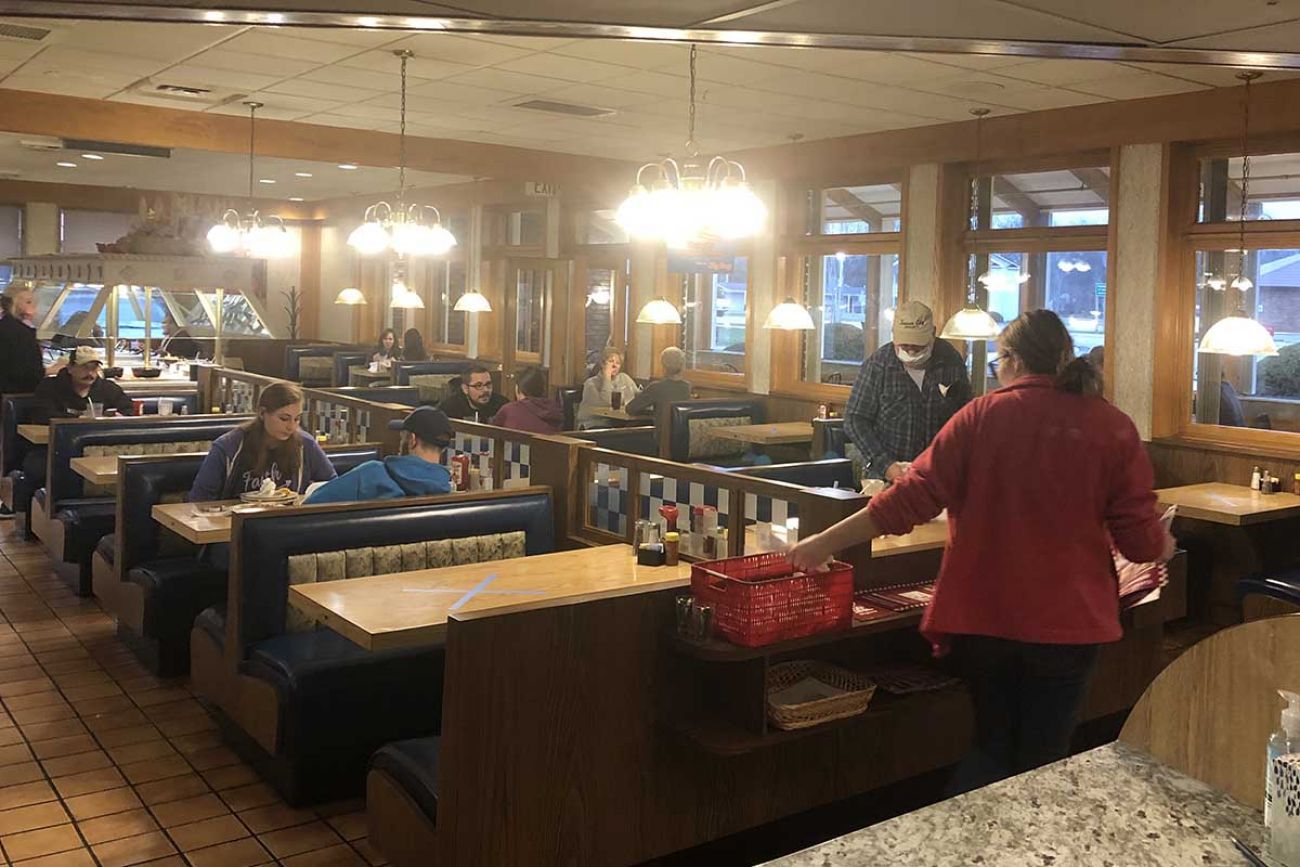Owner of former Michigan Big Boy readies for COVID contempt hearing

The latest battle against Michigan’s order to close restaurant dining rooms is moving from a former Big Boy in the small town of Sandusky to a Thumb-area courtroom, but it could have statewide implications.
Troy Tank, managing partner in the newly rebranded Sandusky Family Diner, will appear via Zoom in front of a Sanilac County Circuit Court judge on Wednesday to argue that his restaurant’s dining room should be allowed to remain open even after the court ordered it closed.
The appearance follows at least 10 citations from the county health department for Tank’s refusal to follow orders initiated Nov. 18 by the Michigan Department of Health and Human Services to limit indoor dining to help reduce the spread of COVID-19. On Dec. 9, the court ordered the restaurant to close its dining room following a request for an emergency injunction by the Sanilac County Health Department, said Bryant Wilke, its director.
Now, Tank said, he plans to argue that he’s not in contempt of court after receiving a summons on Monday.
Breaking the law “is not our intent in any of this,” Tank told Bridge Michigan Tuesday of the motion initiated by Wilke. “We’re refusing to follow an order, and this is different.”
Wilke said the county health department sought the court’s help after daily visits to the restaurant showed not only an operating dining room, but no social distancing, few if any masks among workers and customers and even a buffet dinner, “which is a really bad choice during a pandemic.”
“To me,” Wilke said, “that’s reckless endangerment.”
Related stories:
- Michigan’s COVID indoor dining ban expires within days. Or will it?
- Will Michigan Supreme Court rescue restaurants from COVID dining ban?
- Gretchen Whitmer says Michigan COVID ‘pause’ will go at least 12 more days
Tank is represented by Lansing attorney Dave Kallman, senior legal counsel for the Great Lakes Justice Center, which filed one of the failed lawsuits to stop election certification in Michigan. Kallman also represented Karl Manke, the Owosso barber who defied an earlier closure order by Gov. Gretchen Whitmer and opened his shop in May. Manke became a symbol of defiance against state-ordered business closings during the pandemic.
After a series of battles with the state, including having his license suspended, Manke had misdemeanor charges dropped in October, in part because the Michigan Supreme Court overturned Whitmer’s authority to continue issuing emergency orders. The governor has managed a workaround to that decision by delegating emergency orders to MDHHS.
The latest order affecting bars and restaurants also closed movie theaters, non-tribal casinos, bowling alleys and other entertainment venues, along with high schools. Dining establishments are allowed to continue take-out and delivery and offer outdoor service to customers under the order. The order was issued by MDHHS Director Robert Gordon, with Whitmer announcing Dec. 7 it would be extended until Dec. 20 and lifted “cautiously, not recklessly.”
In announcing the extension, Whitmer said statewide health data showed some progress against the coronavirus, but not enough to warrant prolonged, indoor gatherings of people who don’t share the same household.
“Businesses that are places where people come together inside from different households and remove masks … are uniquely at risk at this time,” Whitmer said at the time.
Since then, including on Tuesday during a press briefing, Whitmer has not indicated when the indoor dining ban will be lifted, though she hinted it may go well into the winter season.
“We have reasons to feel very optimistic about 2021,” Whitmer said, noting that she expects the state’s coronavirus case fight to be “tough” through the end of January, even as new vaccines start to circulate. “Every month will improve.”
Michigan’s struggling bars and restaurants dispute Whitmer’s claim that they cannot reopen safely, with the industry recently asking a federal judge for an emergency order allowing dining rooms to remain open. That attempt failed, but that judge indicated he may ask the Michigan Supreme Court this week to consider the validity of state health orders.
Tank said he followed the state’s initial shutdown order in March, closing the already struggling restaurant that had operated as a Big Boy Restaurant franchise for three generations.
“It decimated us,” Tank said.
The new order puts his business’s very survival into question, he said: “We were out of options as far as how we could limp along and downsize enough to operate.”
Panic over the latest restrictions has been running through much of the restaurant industry, which already had been operating for months at 50 percent capacity. New survey data released Tuesday by the Michigan Restaurant & Lodging Industry said that one-third of Michigan restaurant operators don’t expect to be in business by the start of summer without additional relief packages from the federal government.
Financial hits to the owners are also affecting staff, with 63 percent expecting to lay off more workers over the next six months. The industry is the hardest hit in the state, according to Michigan unemployment data, with 139,800 leisure and hospitality workers laid off as of October, before the so-called state “pause” on some business and school activities took effect.
“It is fundamentally clear that the pandemic is decimating the hospitality industry in this state to a degree never seen or even imagined,” said Justin Winslow, CEO of the restaurant and lodging association, in a statement on Tuesday. “While it will take several years and a stable economy to reclaim the size, impact and opportunities produced by this industry, we have not yet reached the bottom.”
Almost half of Michigan restaurant owners surveyed are considering closing altogether. That’s something Tank said isn’t an option due to his fixed expenses, which include maintaining a building valued at $1 million. While some restaurants turn to outdoor dining and carryout sales, neither is an option for Tank’s restaurant, he said.
He decided to defy the November order, and his employees joined him. After opening, he said he received at least $20,000 in donations, which Tank said is more than enough to cover his fines. Business was brisk, and just two days before the court summons was served, he was advertising for a cook. “We are open and we are busy,” according to a Facebook post.
However, the lack of coronavirus precautions concerned Wilke, as the county of 42,000 people deals with a spike in COVID cases he describes as “rampant.”
Ten people in Sanilac County died between Friday and Monday, bringing the overall fatality rate to 43, Wilke said. His office sees 18-25 new COVID cases per day, and has a positive test rate of 12 percent to 14 percent.
One outbreak in Sanilac is at a long-term care facility, Wilke said. There are some indications the virus has affected customers of the restaurant within days of visiting it, but health department staff have found “no direct disclosures,” he said.
The restaurant now runs as an independent operation, Tank said, after it terminated its franchise with Big Boy in late November following corporate officers speaking out against the restaurant opening despite state order, according to news reports.
MDHHS investigated at least several dozen validated reports of bars and restaurants across the state that violated the initial order, said spokesperson Lynn Sutfin.
At least six businesses so far received emergency liquor license suspensions as a result of those investigations, according to the state. Several restaurants, including the former Sandusky Big Boy, also received citations by MDHHS that accompanied a $1,000 fine for every day it violated the order.
Tank said he’s surprised more restaurants didn’t follow his example. Wilke said Sanilac County investigated three other businesses that didn’t comply with the order, but they’ve since done so.
Going to court wasn’t a step to shut down the Sandusky Family Diner, Wilke said, just “to go to take-out only … and follow [the state’s] emergency rules.”
Tank said he didn’t start the situation to gain fame like Manke, the Owosso barber, but said he hopes for a similar outcome.
Until the case is resolved, he will work with his attorney to reopen his dining room. “Keeping personal politics out of it,” he said, “I’m certain these orders will be deemed unconstitutional.”
Business Watch
Covering the intersection of business and policy, and informing Michigan employers and workers on the long road back from coronavirus.
- About Business Watch
- Subscribe
- Share tips and questions with Bridge Business Editor Paula Gardner
Thanks to our Business Watch sponsors.
Support Bridge's nonprofit civic journalism. Donate today.
See what new members are saying about why they donated to Bridge Michigan:
- “In order for this information to be accurate and unbiased it must be underwritten by its readers, not by special interests.” - Larry S.
- “Not many other media sources report on the topics Bridge does.” - Susan B.
- “Your journalism is outstanding and rare these days.” - Mark S.
If you want to ensure the future of nonpartisan, nonprofit Michigan journalism, please become a member today. You, too, will be asked why you donated and maybe we'll feature your quote next time!




